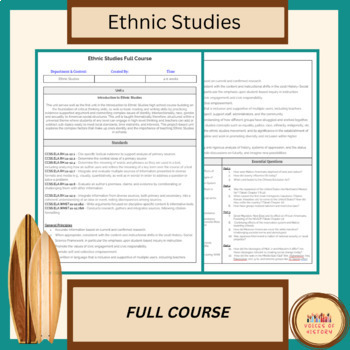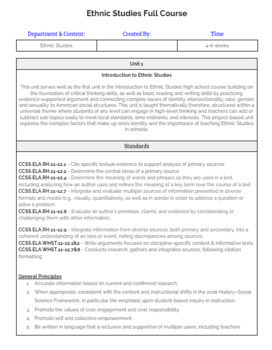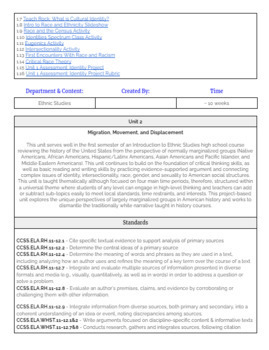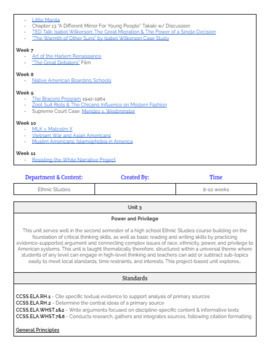Ethnic Studies FULL COURSE
- Google Docs™

Description
Ethnic Studies Course Outline
Written By: Stephanie Suffield
Adapted from San Mateo High School & Mission Vista High School
Class Overview and Objectives
Course Rationale: In 2016, the new Social Science Framework was adopted and includes Ethnic Studies; “It is important for Ethnic Studies courses to document the experiences of people of color in order for students to construct counter-narratives and develop a more complex understanding of the human experience. Through these studies, students should develop respect for cultural diversity and see the advantages of inclusion” (p. 419-424). Additionally, in October 2021, Governor Gavin Newsom signed the bill, AB 101, that will require every student at a public high school in the state to take an ethnic studies course. Starting with students graduating 2029-2030. Several districts in California, including in San Diego County already offer Ethnic Studies classes, and in many it is already a graduation requirement.
Course Description: This Ethnic Studies course is designed for students to be politically, socially and economically conscious about their personal connections to local and global histories. By studying the histories of race, ethnicity, nationality, sexuality, and culture, students will cultivate respect and empathy for individuals and solidarity with groups of people locally, nationally, and globally so as to foster active social engagement and community building. Particular focus will be given to the contributions, and struggles of different racial and ethnic groups for liberty, equality, and justice in the United States. Students will investigate and analyze the historical factors of power and privilege and the subsequent impact on historically disadvantaged groups’ ability to navigate and mitigate internal and external structures that influence their human experience. Students will apply in-depth analysis to contemporary issues and collectively pose creative, self-affirming solutions in a variety of ways to promote agency through grassroots community advocacy and civic engagement. This course is intended to help build inter-ethnic understanding and socio-cultural bridges in an increasingly more multicultural and multiethnic nation, which is imperative to creating a just society.
Course Goals: Students will:
- Have a better understanding of themselves in context of the history of the United States and our contemporary society.
- Be able to discuss their identities, including race, ethnicity, culture, sexulaity and nationality and the ways these categories are socially constructed and how they affect students’ lives and the lives of others.
- Be able to explain the dynamics among internalized, interpersonal, and institutional oppression and resistance.
- Develop academic skills in reading, analysis, and writing of historical narratives which can be applied in multiple academic courses.
Key Assignments (activities, projects, etc):
- Journal writing throughout the course
- Identity Iceberg
- Music with lyrics
- Analyzing primary source documents, data, and art
- Analyzing maps
- Presentations
Instructional Methods/Teaching Strategies:
- Project-Based Learning
- Personalized Learning
- Collaborative Learning
- Direct Instruction
- Interviews
- Guest Speakers & Presentations
- Gallery Walks
- Class Discussions
- HIPPOS Reading Analysis protocol
- AXES Writing
Assessments:
- Group & Individual Projects
- AXES Writing (paragraphs & essays)
- Research Based Projects
Instructional Resources:
→ Text(s)
- A Different Mirror for Young People: A History of Multicultural America, by Ronald Takaki, adapted by Rebecca Stefoff (2012).
→ Supplemental
- Learning for Justice
- Facing History
- Zinn Education Project
- Ted Talks
- Teach Rock
- PBS
- Various Documentaries
Units:
1. Introduction to Ethnic Studies
2. Migration, Movement, and Displacement
3. Power and Privilege
4. 20th and 21st Century Problems and Progress
5. Application and Action (Final Research Project)





